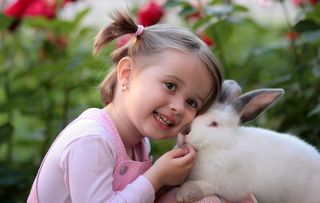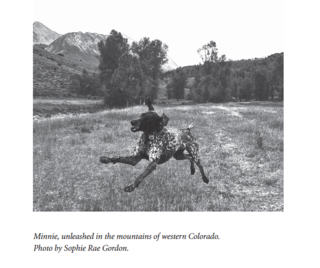Empathy
Walking a Dog Can Help Us Walk the Talk About Other Animals
Dogs can help people learn about the inconsistencies in how we treat animals.
Posted December 30, 2018
Nonhuman animals aren't less than human animals
"Man in his arrogance thinks of himself a great work, worthy the interposition of a deity. [Yet it is] more humble and, I believe, true to consider him created from animals." —Charles Darwin, The Descent of Man
At the end of each year, I try to think of ways to ask people not only to treat nonhuman animals (animals) with more respect, compassion, empathy, and dignity, but also to reflect on the inconsistencies with which they view and treat them. For some time now, it's become clear that by focusing on our relationships with dogs, we can learn about these inconsistencies that typically incorporate denialism, essentially, the irrational rejection of truth or scientific facts and speciesism. In Rewilding Our Hearts: Building Pathways of Compassion and Coexistence, I've proposed that humans can rightfully be called Homo denialus. (For more discussion, see Michael Specter's Denialism: How Irrational Thinking Hinders Scientific Progress, Harms the Planet, and Threatens Our Lives.)
Speciesism also influences how humans view and treat other animals. Speciesism, as defined by the Oxford English Dictionary, refers to the "discrimination against or exploitation of certain animal species by human beings, based on an assumption of mankind’s superiority," involves assigning different values or rights on the basis of species membership, and constructs false boundaries among species. Speciesism doesn't work, because it assumes human exceptionalism, and also because it ignores within-species variation that often is more marked than between-species differences, a fact that is extremely obvious in domestic dogs. Speciesism also ignores the importance of individuals. (See The Animals' Agenda: Freedom, Compassion, and Coexistence in the Human Age, "Individual Animals Count: Speciesism Doesn't Work," "Animal Minds and the Foible of Human Exceptionalism," and links therein.) For example, all and only humans might constitute a protected group regardless of an individual's unique characteristics. When animals such as great apes are protected from invasive research, this decision is speciesist, because all great apes are protected regardless of an individual's unique characteristics. Speciesism also results in animals being classified hierarchically as “lower” and “higher,” with humans on the top rung of the ladder. This speciesist view clearly ignores individual variations in behavior within and between species, and hierarchical speciesism results in endless harm and is bad biology. Speciesists often use taxonomic or behavioral (cognitive, emotional) closeness to humans, similar appearance, or the possession of various cognitive capacities displayed by normal adult humans to draw the line that separates humans from other animals. Cognitive abilities include the capacities for self-awareness, to engage in purposive behavior, to communicate using a language, to make moral judgments, and to reason (rationality). The bottom line is that nonhumans aren't less than humans. Different doesn't mean "less than," "more than," "less valuable than," or "more valuable than."
Let's listen to youngsters, ambassadors for a more compassionate future

As I was writing this essay, I thought about some questions I've been asked by youngsters that are relevant to the topics at hand. These include: "What allows people to kill cows and pigs and chickens and other animals, but not dogs?"; "What allows people to say one thing and do another?"; "How Come People Say They Love Animals and Kill Them?"; "Why don't people 'walk the talk' when they say they love animals and then kill them?"; and "How can my friend's father say he loves deer and then hunt them for fun?" I also thought about how New Zealand's violent and brutal war on wildlife is using youngsters to harm and to brutally kill so-called "pests." Luckily, some kids are speaking out against these school-sanctioned activities and asking questions, such as: "Why Is It Wrong to Not Want to Kill Animals?" (Also see "Violence Toward Animals: 'Can You Please Help My Daughter?'")
Where to go from here?
"We need another and a wiser and perhaps a more mystical concept of animals. Remote from universal nature, and living by complicated artifice, man in civilization surveys the creature through the glass of his knowledge and sees thereby a feather magnified and the whole image in distortion. We patronize them for their incompleteness, for their tragic fate of having taken form so far below ourselves. And therein we err, and greatly err. For the animal shall not be measured by man. In a world older and more complete than ours they move finished and complete, gifted with extensions of the senses we have lost or never attained, living by voices we shall never hear. They are not brethren, they are not underlings; they are other nations, caught with ourselves in the net of life and time, fellow prisoners of the splendour and travail of the earth." —Henry Beston, The Outermost House, 1928
This 90-year old quotation from Henry Beston is one of my all-time favorites when I think about how we treat and view other animals, and where we're heading in the future. It needs to be read in full, and I always wish it could be made into a poster that would go viral globally. It also could form the basis for an entire course in animal-human relationships. I go to it constantly, because it says so much about who other animals are and about our relationships with them. First, we do indeed view others through our own senses, and as we have clearly seen, dogs don’t sense the world how we do. So our views are, indeed, distorted. We also patronize them for not being like us, for what we perceive as their incompleteness, as if we are complete. This misrepresentation allows some people to place dogs and other animals below us on some mythical evolutionary scale. They’re referred to as “lower” beings, a move that results in rampant mistreatment and egregious abuse. As Beston asserts, “And therein we err,” for we should not be the template against which we measure other animals. I also like how he views other animals as “other nations,” since this asks us to view them as the beings they are, not as what we want them to be. And, surely, dogs and other animals are caught up in the “travail of the earth,” captive to whatever we want them to do and whoever we want them to be. As we’ve seen, this makes for a good deal of stress in their lives as they try to adapt to a human-dominated world.
Let's allow dogs to help us bridge the empathy gap to other animals, nonhuman and human

My purpose here is to make a simple request, which is to ask people to think about how they view and treat other animals and to try as hard as they can to iron out the wrinkles in how they make decisions about who lives, who dies, and why. I'm focusing on dogs, because they can and should help humans bridge the empathy gap and serve as a "gateway" species to include other nonhumans in the arena of compassion. (See "'Everyone Wants a Lost Dog Found,' Bridging the Empathy Gap.") These other animal beings do not suffer less than dogs when they're mistreated and abused, so it's important to ask, "Why the disconnect?" and "Why are there rampant and blatant inconsistencies in how dogs (and other companion animals) are treated, and how non-companion animals are treated?"
It's also important to know how people deal with these obvious inconsistencies in how they view, treat, or allow other animals to be treated using denial, ignorance, or other rationalizations. (See "'Oh, I know animals suffer, but I love my steak': The self-serving resolution of the 'meat paradox'," Hal Herzog's Some We Love, Some We Hate, Some We Eat: Why It's So Hard to Think Straight About Animals and Melanie Joy's Why We Love Dogs, Eat Pigs, and Wear Cows: An Introduction to Carnism.) We also need to appreciate how fascinating other animals are, and that we can no longer continue to be over-producing, over-consuming, arrogant, big-brained, big-footed, and invasive mammals who don't give other animals the respect, compassion, and love they deserve.
I often wonder if dogs, by bridging the empathy gap among humans, could help to heal our wounded world by bringing together people of all ages and all cultures who share an attachment and affection for these wonderful beings. This would be a win-win for all animals, nonhuman and human, because all individuals matter. (See "Why People Should Care About Animal and Human Suffering.")
We are most fortunate to have dogs in our lives, and we must work for the day when all dogs are most fortunate to have us in their lives. In the long run, we’ll all be better for it.
A new year's resolution: Let's "walk the talk" and let dogs lead the way
"Harming animals won't stop until people stop harming them." —Jeannette, 9-year old
"Animals don't care if we didn't intend to hurt or kill them. They suffer anyway." —Eight-year old in conversation with me
As we move into 2019 and beyond, we need to "walk the talk." Jeannette is right on the mark when she said, "Harming animals won't stop until people stop harming them." I know how simple and silly this might sound to some people, but it's true. It's also the case that "The 'It's OK to Kill Animals Humanely' Apology Doesn't Work," and many or most youngsters know this. They and others know there is no way that the vast majority of animals who are killed by humans are going to be killed in any way that resembles "being killed humanely." Killing "humanely" is not "killing softly."
In upcoming years, let's put killing nonhuman animals on hold and leave future generations with a more compassionate and empathic ethos. No one has to apologize for treating all beings with respect and dignity. If you're against harming and killing, please speak out, but it's best not to say you are against harming and killing them and then do it yourself or allow others to do it for you. If you need some sort of mantra keep repeating, "Harming animals won't stop until people stop harming them." And, all the while, try to practice the 12 Ps of rewilding, namely, being proactive, positive, persistent, patient, peaceful, practical, powerful, passionate, playful, present, principled, and proud. (Also see "A Journey to Ecocentrism: Earth Jurisprudence and Rewilding.")
Simply put, we owe it to future generations to leave them a more compassionate, empathic, and peaceful world, and it's difficult to imagine anyone arguing against this view. So, as we move into 2019 and beyond, a wonderful legacy would be to strive for peaceful coexistence and justice for all and to "walk the talk." That's not asking too much, is it?




